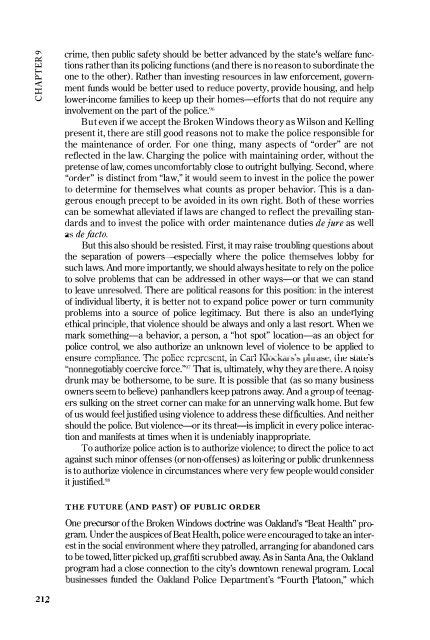Kristian Williams - Our Enemies in Blue - Police and Power in America
Kristian Williams - Our Enemies in Blue - Police and Power in America
Kristian Williams - Our Enemies in Blue - Police and Power in America
You also want an ePaper? Increase the reach of your titles
YUMPU automatically turns print PDFs into web optimized ePapers that Google loves.
one to the other) . lther than <strong>in</strong>vest<strong>in</strong>g resources <strong>in</strong> law enforcement, govern-t:icrime, then public safety should be better advanced by the state's welfare func-tions rather than its polic<strong>in</strong>g functions (<strong>and</strong> there is no reason to subord<strong>in</strong>ate thement funds would be better used to reduce poverty, provide hous<strong>in</strong>g, <strong>and</strong> helpU lower-<strong>in</strong>come families to keep up their homes--efforts that do not require any<strong>in</strong>volvement on the part of the police.%But even if we accept the Broken W<strong>in</strong>dows theory as Wilson <strong>and</strong> Kell<strong>in</strong>gpresent it, there are still good reasons not to make the police responsible forthe ma<strong>in</strong>tenance of order. For one th<strong>in</strong>g, many aspects of "order" are notreflected <strong>in</strong> the law. Charg<strong>in</strong>g the police with ma<strong>in</strong>ta<strong>in</strong><strong>in</strong>g order, without thepretense of law, comes uncomfortably close to outright bully<strong>in</strong>g. Second, where"order" is dist<strong>in</strong>ct from "law," it would seem to <strong>in</strong>vest <strong>in</strong> the police the powerto determ<strong>in</strong>e for themselves what counts as proper behavior. This is a dangerousenough precept to be avoided <strong>in</strong> its own right. Both of these worriescan be somewhat alleviated if laws are changed to reflect the prevail<strong>in</strong>g st<strong>and</strong>ards<strong>and</strong> to <strong>in</strong>vest the police with order ma<strong>in</strong>tenance duties de jure as wellas de /acto.But this also should be resisted. First, it may raise troubl<strong>in</strong>g questions aboutthe separation of powers-especially where the police themselves lobby forsuch laws. And more importantly, we should always hesitate to rely on the policeto solve problems that can be addressed <strong>in</strong> other ways--or that we can st<strong>and</strong>to leave unresolved. There are political reasons for this position: <strong>in</strong> the <strong>in</strong>terestof <strong>in</strong>dividual liberty, it is better not to exp<strong>and</strong> police power or turn communityproblems <strong>in</strong>to a source of police legitimacy. But there is also an underly<strong>in</strong>gethical pr<strong>in</strong>ciple, that violence should be always <strong>and</strong> only a last resort. When wemark someth<strong>in</strong>g-a behavior, a person, a "hot spot" location-as an object forpolice control, we also authorize an unknown level of violence to be applied toensure complh."1ce. Thc policc represent, irt Carl l(1" ,kcu ;:,';:, v1u d:se, lhe slale's" llonnegotiably coercive force."97 That is, ultimately, why they are there. A noisydrunk may be bothersome, to be sure. It is possible that (as so many bus<strong>in</strong>essowners seem to believe) panh<strong>and</strong>lers keep patrons away. And a group of teenagerssulk<strong>in</strong>g on the street corner can make for an unnerv<strong>in</strong>g walk home. But fewof us would feel justified us<strong>in</strong>g violence to address these difficulties. And neithershould the police. But violence-or its threat--is implicit <strong>in</strong> every police <strong>in</strong>teraction<strong>and</strong> manifests at times when it is undeniably <strong>in</strong>appropriate.To authorize police action is to authorize violence; to direct the police to actaga<strong>in</strong>st such m<strong>in</strong>or offenses (or non-offenses) as loiter<strong>in</strong>g or public drunkennessis to authorize violence <strong>in</strong> circumstances where very few people would considerit justified.98THE FUTURE (AND PAST) OF PUBLIC ORDEROne precursor of the Broken W<strong>in</strong>dows doctr<strong>in</strong>e was Oakl<strong>and</strong>'s ''Beat Health" program. Under the auspices of Beat Health, police were encouraged to take an <strong>in</strong>terest<strong>in</strong> the social environment where they patrolled, arrang<strong>in</strong>g for ab<strong>and</strong>oned carsto be towed, litter picked up, graffiti scrubbed away. As <strong>in</strong> Santa Ana, the Oakl<strong>and</strong>program had a close connection to the city's downtown renewal program. Localbus<strong>in</strong>esses funded the Oakl<strong>and</strong> <strong>Police</strong> Department's ""Fourth Platoon," which212


